
Gospel reading: Mark 1:7-11
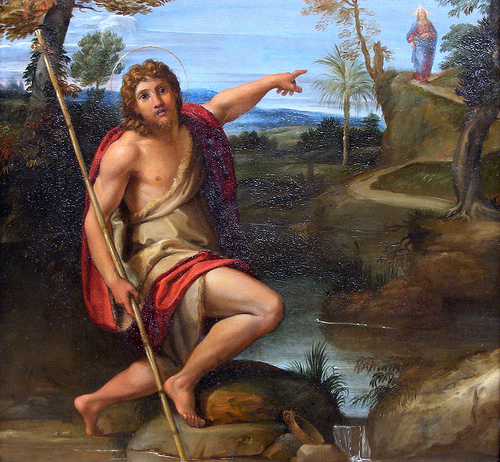 Vs.7 In the course of his preaching, John the Baptist said, “Someone is following me, someone who is more powerful than I am, and I am no fit to kneel down and undo the strap of his sandals.
Vs.7 In the course of his preaching, John the Baptist said, “Someone is following me, someone who is more powerful than I am, and I am no fit to kneel down and undo the strap of his sandals.
Vs.8 I have baptized you with water, but he will baptize you with the Holy Spirit.”
Vs.9 It was at this time that Jesus came from Nazareth in Galilee and was baptized in the Jordan by John.
Vs.10 No sooner had he come out of the water than he saw the heavens torn apart and the Spirit, like a dove, descending on him.
Vs.11 And a voice came from heaven,
“You are my Son, the Beloved; my favour rests on you.”
*******************************************************************
We have three commentators available from whom you may wish to choose . Scroll down to the name of the commentator.
Michel DeVerteuil : The late Holy Ghost Father, Teacher in Lectio Divina.
Thomas O’Loughlin: Prof of Hist. Theology Uni of Nottingham NG7 2RD Donal Neary SJ: Editor of The Sacred Heart Messenger and National Director of The Apostleship of Prayer.
****************************************
Michel DeVerteuil
Lectio Divina with the Sunday Gospels
www.columba.ie
General Comments
Mark’s gospel was the first gospel to be written and therefore tells us some basic points about Jesus. Nowadays we are inclined to neglect some of them because we think they have little importance. We must however give them their full meaning. They will help us understand the mystery of faith as the church of the early ages understood it.
The passage is in two parts:
verses 7 and 8, and verses 9 to 11. We will only look at the second part which tells of Jesus’ baptism.
This incident happens very early in the gospel story. We learn in the introduction that Jesus “came from Nazareth in Galilee”; it was there, in that small position, that he finally made the decision to enter his public life. He was led to his public role.
He decided that he would go out there and assume his role as Messiah and Saviour of his people. Jesus wanted to be baptized. The river Jordan was a great river in Palestine, near Jerusalem, and he decided that this was where he would be baptized. It was no ordinary baptism, it was “a baptism of repentance and for the forgiveness of sins.” This was happening to many of his people and he wanted to join them at this point.
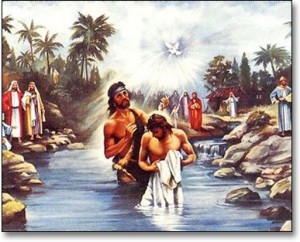
Clearly, this was an important moment in his life, when he accepted to be with his fellows. It is important that he should be the same with us.
When he came up “out of the water” something extraordinary happened – something that would remain crucial to him and to the rest of his ministry.
– “The heavens were torn apart”. Everything else became unimportant.
This was a real breakthrough in his relationship with God and with the world. For us today too there are things on which we need to turn our back on if we want to live fully and in the present. Now we realize that they might have been important but could be obstacles between God and us. They prevent us from finding our true self and what we really want from life.
This often happens to us as a church community too. Unimportant things in the world – status, authority, the desire to be admired by all – become obstacles to our following of Jesus.
*The voice that came from heaven was “in the form of a dove.” This was a communication which had been with God’s people from the beginning of creation. In Genesis 1:2 we see it said of God when he came to earth to carry out his work there. It is the same right through, and in every aspect of life.
*The Spirit then “descended on us.” This tells us that we can now find our true self by allowing the Spirit to come to us and take possession of us. We leave ourselves entirely in his hands.
* A voice “came from heaven”, and the words it spoke tell us three important things about Jesus, and therefore about ourselves:
a) “you are my child”. You are someone very precious to me, someone I would be happy to be alone with, someone I can trust easily.
b) you are “the Beloved”, called to be important to me; I love them and they are one with me;
c) “My favour rests on you”. This is a crucial phrase in the Bible. God’s favour rests on us – whatever we thought about the world now counts for nothing; it is unimportant to him and to us.
Together these words tell us what counts between Jesus and God; they also tell us what happens between us and God.
Scripture Prayer Reflection
Lord, we thank you for those times when we realized that things we had considered important in the world were really of no interest to us: they did not lead us to you. We knew then how we must leave them on the shore and go forward to be baptized by John.
We saw then that things we were attached to were of no consequence to us.
 It was a touching time.
It was a touching time.
We could leave the past, our own Nazareth in Galilee and make our way to Judaea;
it was not fame or glory that we sought.
We must now ensure that we meet you as you are.
You would really manifest yourself to us
and tell us that this is what really counts and is important for us.
“The other true purpose of school studies, of education, is to inculcate humility, not just a virtue, but the condition of all virtues.” … Simone Weil
Lord, help us to see the greatness of all you do for us,
our education as humans and as Christians.
“Whosoever is at pains to read the psalm will find in it a sort of gymnasium for the use of all souls, a sort of stadium of virtue, where different sorts of exercises are set out before us, from which we can choose the one best suited to train us to win our crown.” … St Ambrose
Lord, we thank you that as we came out of the water,
something new happened to us.
the heavens were eventually what they now truly are for us,
the source of all we need in this world, all that is worth our while to follow.
“The best of all for the soul is what God wills at this particular moment. Everything else must be regarded by the soul with perfect indifference as being nothing at all.” ...Jean Pierre de Caussade, S.J.
Lord, we thank you for the times when all that is crucial for us
is who we are and who you are.
All the rest is like nothing at all
and we thank you that we are now in that state where everything else
are things on which we know that we must now turn our back
and leave them behind us on this shore.
Lord, we thank you for the great moments of prayer when we finally become aware of how limited we are.
Things we sought with so much interest now counted for nothing.
We thank you for the times when we finally realized how unimportant they really were, in spite of what we had thought .
What we used to set our heart on:
– our status in life,
– fame and what we really look out for in our lives;
– our desire to be great and famous in your kingdom, which means being better and holier that those we live with,
we thank you that we see them now as things that would keep us from you.
We thank you that we have now left them behind
and go for what is really important for us – that we are your children, your beloved, and that, no matter what we think, these are the reasons why your favour now rests on us.
Lord, we thank you for giving us the things that are most important for us.
They may seem boring but we know they are very deep and wonderful for us.
We can now devote our lives to them and make sure that they are really what counts for us.
“The religious life has the best of all messages, one that is presented in a most boring way.” …G. K. Chesterton
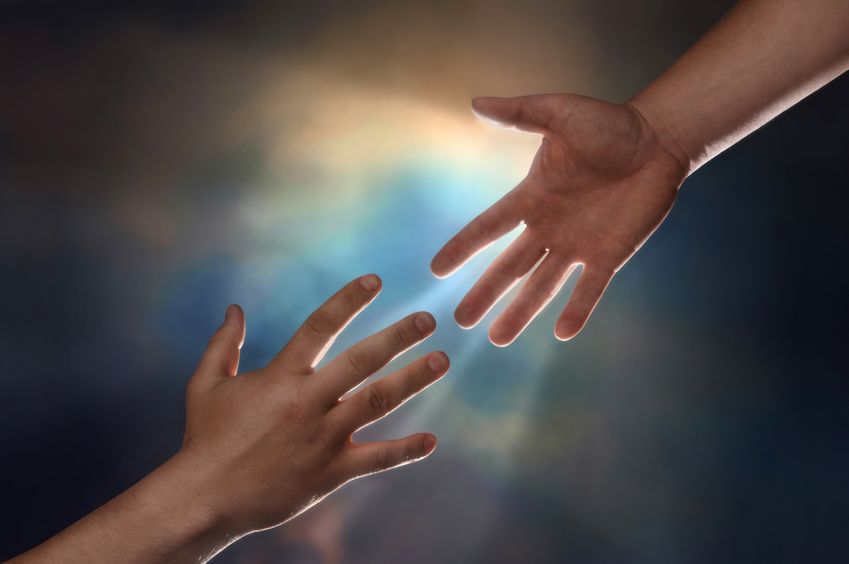 Lord, as we look around at what is going on in the world today,
Lord, as we look around at what is going on in the world today,
we remember that these things tell us very little about you,
about our relationship with you,
and how we are to grow in knowledge with you.
We pray that we may turn our backs on them and focus on how we can draw closer to you.
Lord, we thank you for the time when we really understood
that the only thing that counts for our community
is whether we are right with you and what we need from life.
********************************************************
Thomas O’Loughlin
Liturgical Resources for the Year of Matthew
www.columba.ie
Introduction to the Celebration
Today marks the beginning of the public life and ministry of Jesus Christ as he set out to do the Father’s will and announce the arrival of the kingdom of God. And the moment of the beginning of the messianic work of Jesus is marked by the moment of his baptism in the Jordan. He is acclaimed on earth by the prophet John and links himself to John by being baptised by him. He is acclaimed from heaven by the voice of the Father and the presence of the Spirit. As the people who have heard his preaching and accepted his call, who have confessed him as the Christ, and set out to follow his way, let us pause and consider the words addressed to Jesus:
‘Thou art my beloved Son, with thee I am well pleased.’
Homily Notes
1. Today is a day of celebrating beginnings in the liturgy: the beginning of the preaching and the public ministry of Jesus which is announced with the great cry from heaven of the Father’s joy in the work of his beloved Son. Yet Mark expects that as you hear this opening blaze of heavenly light and glory, you know and remember that his story will end in the darkened Friday of the crucifixion. We also are now at a beginning: the beginning of a year. The initial excitement of New Year is over, the champagne has been corked and drunk; so we can now stop and reflect that a new period of our lives in the world is beginning.
 2. The public ministry of Jesus today is that which is carried out by you and me, the individuals that go to make up the Body of Christ, the church. Preaching the truth, doing the truth in love, bearing witness to the Father, caring for the poor, being attentive to the Spirit, recognising the presence of God in respecting the environment, seeking justice and peace, offering thanksgiving to the Father in the liturgy — all these are the public works of the Son carried out by his people. Now is the time to take stock and ask are we being attentive to this public ministry with which we are charged.
2. The public ministry of Jesus today is that which is carried out by you and me, the individuals that go to make up the Body of Christ, the church. Preaching the truth, doing the truth in love, bearing witness to the Father, caring for the poor, being attentive to the Spirit, recognising the presence of God in respecting the environment, seeking justice and peace, offering thanksgiving to the Father in the liturgy — all these are the public works of the Son carried out by his people. Now is the time to take stock and ask are we being attentive to this public ministry with which we are charged.
3. There is no end to the variety of public ministry to which we are called in imitation of Christ, to do the will of the Father, being empowered by the Spirit. However, let us take three examples.
4. Bearing witness to the truth. We live much of our lives being buffeted
by propaganda of one sort or another: whether it is formal propaganda intended to create great lies that oppress people,
to advertising, to manipulating numbers to prove a point, to putting a spin on a story.
There is even the realisation that if you repeat an idea often enough, people will become so familiar with it that they will assume it is some basic fact. Do we simply acquiesce with this, or do we seek to get behind the bald headlines, strap-lines, and tags? Do we confront the part we may be playing in the propagation of falsehoods out of selfishness or the desire for power? Honesty is the obedience that we owe to the structure of the creation, doing the truth is a holy activity because God is the source of all trut

The lie, big or small, is the witness to all that is not of God and has no place in the kingdom; as we see in just four words in the name Jesus gave Satan: ‘The Father of Lies’ Un 8:44)
5. Caring for those who suffer oppression. The oppressed are all those who are in need and cannot escape from that situation by their own exertions: be it illness, or poverty, or ignorance, or as a result of injustice. We believe in a God who forgives and gives us chance after chance, and who challenges us to do to others as we would have them do unto us. To acknowledge the goodness of God to us is to accept that we have an obligation to show that same goodness. 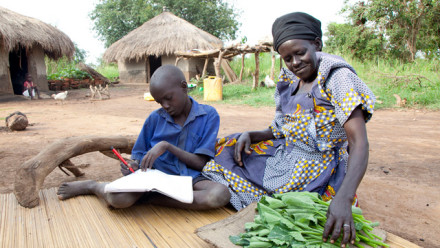 This care is not something ‘added on‘ to being a Christian, but what makes us a holy people. God is holy in his action towards us: he loves us in our needs; we act in a holy way in imitation of God when we seek to act with love to those in need. Thus a holy people can pray: forgive us our trespasses as we forgive those who trespass against us.
This care is not something ‘added on‘ to being a Christian, but what makes us a holy people. God is holy in his action towards us: he loves us in our needs; we act in a holy way in imitation of God when we seek to act with love to those in need. Thus a holy people can pray: forgive us our trespasses as we forgive those who trespass against us.
6. Respecting the creation. Because the environment in which we live is material does not mean that we can look on it with indifference or as something simply to be used and discarded. We believe that the whole of the creation is God’s gift and that all that was made was made through the Word: it is’shot through’ with the character of the Word who in the fullness of time took on our humanity for our salvation. But if the world is God’s gift and bears the traces of the Creator within it, then we must respect it and use it with care, conscious that it is here to sustain life not just for us but for all the generations to come. We live in a world where we march through the creation like vandals, but this is incompatible with acknowledging the Father, or calling ourselves disciples of the Son, or claiming that the Spirit enlightens us.
7. In all of these it is often quite acceptable ‘to mouth the truth’: to talk for example of being less exploitative or less consumerist, but when this starts to become actual in deeds it starts to become painful. It is one thing to say one abhors falsehoods; it is another thing to actually point it out. It is easy to fret over care for the elderly or the poor, another thing to actually visit an elderly relative or give enough money to groups that work with the homeless. Here Christianity confronts us with the reality of the cross. Ours is not a polished philosophy of rhetoric and good intentions: the public witness to the Fa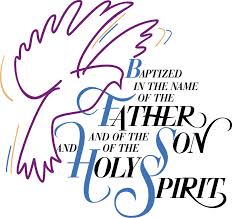 ther’s will ended for Jesus in his death, his humble obedience right to the bitter end. It is the willingness to embrace this reality of the pain inherent in doing the good in the midst of a sinful world that sets us apart. It is only in grasping this reality, that the true and the good cost, and building the kingdom makes demands on us, that we become the beloved daughters and sons of the Father.
ther’s will ended for Jesus in his death, his humble obedience right to the bitter end. It is the willingness to embrace this reality of the pain inherent in doing the good in the midst of a sinful world that sets us apart. It is only in grasping this reality, that the true and the good cost, and building the kingdom makes demands on us, that we become the beloved daughters and sons of the Father.
8. To recall the scene of the baptism of Jesus is to resolve anew to being his public witnesses in the world.
***************************************************
Sean Goan
Let the Reader Understand
www.columba.ie
Gospel
In all the gospels the baptism of Jesus marks the beginning of his public ministry and the focus is on Jesus’ identity as he sets out to proclaim the kingdom of God. In Mark’s account of the event it is clear that what takes place is for Jesus’ sake, as we are told it is he (and not the crowds) who sees the Spirit descend in form of the dove and the voice from heaven is addressed to as it proclaims: ‘You are my beloved Son.’ The evangelist would have us understand that, as Jesus sets out on his mission,
he does with a sense of who he is before God. It is precisely this that allows him to be faithful to his task to the very end.
Reflection
Today’s feast is an invitation to reflect on our own baptism. We too have been baptised with the Holy Spirit, the same Spirit that empowered Jesus to proclaim the kingdom and to endure the sufferings that lay before him. In our baptism the Spirit proclaims to each of us that we are God’s beloved and challenges us to be true to ourselves and to our God as we try to live according to the values of the kingdom that Jesus preached.
**************************************************
Donal Neary SJ
Gospel Reflections
www.messenger.ie/bookshop/
New Energy
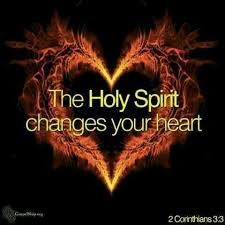 Jesus’ baptism by John was a special moment – the real coming of God’s spirit upon him, the Spirit who had come on Mary at the moment of Jesus’ conception, and would be with Jesus at his last moments on the Cross.
Jesus’ baptism by John was a special moment – the real coming of God’s spirit upon him, the Spirit who had come on Mary at the moment of Jesus’ conception, and would be with Jesus at his last moments on the Cross.
The spirit brings him new energy. This feast marks that something new is happening, and that Jesus knows he is the beloved son; from eternity and into time.
The Spirit came upon him – but not just for himself. He would send the Spirit later to us, to help us to forgive and to persevere in doing good.
This is a feast about energy. Jesus found a new spirit in himself after his prayer and he heard words he would never forget. Maybe you have heard words of love from someone you will never forget. They give energy to the heart and soul, making us people always on the go, ready for new life within us.
The spirit pours the energy of God into bread and wine and they are changed forever. He sends himself forever, sending the love and presence and energy of God.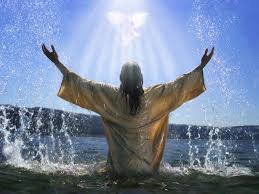
We know that we can get stuck. We need new infusions of the Spirit to give new energy. Can we be the type of people who others think it’s good to meet? Can we be people open to the spirit of God, open to new life, new love, and being really fully the individuals we can be?
Recall your baptism: imagine water being poured over you,
and allow this love of God fill you today.
Lord, thank you for the gift of Baptism.